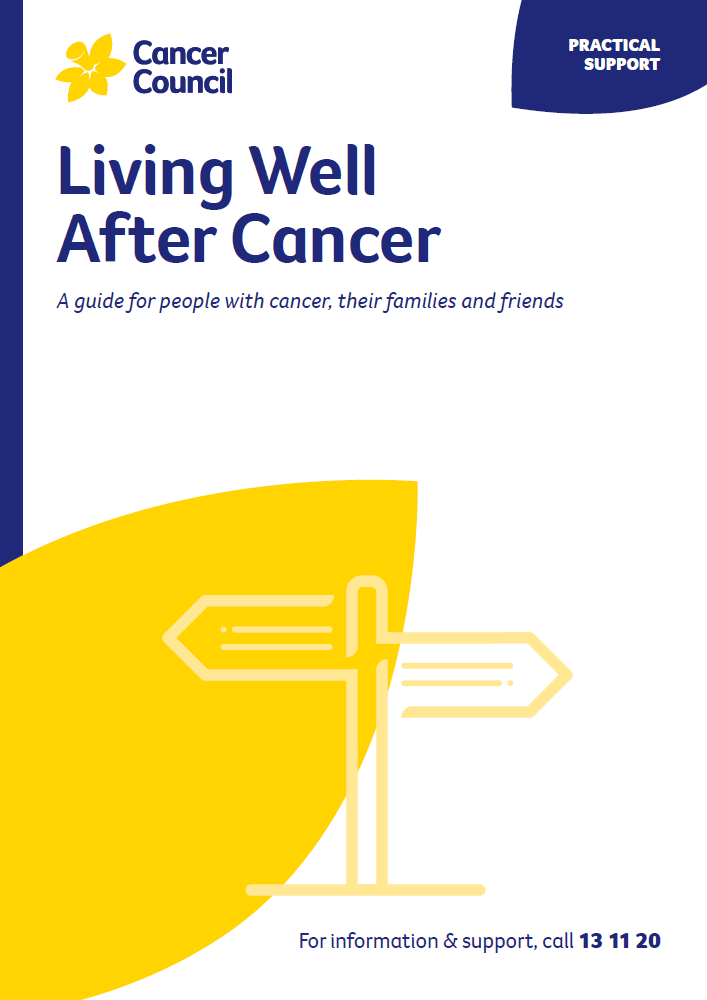- Home
- Pancreatic cancer
- Living with pancreatic cancer
Living with pancreatic cancer
Life after a diagnosis of pancreatic cancer can present many challenges. It is important to allow yourself time to adjust to the physical and emotional changes. Establish a new daily routine that suits you and the symptoms you’re coping with. Your family and friends may also need time to adjust.
Learn more about:
- Overview
- Dealing with feelings of sadness
- Looking after yourself
- When the cancer is advanced
- Video: Caring for someone with pancreatic cancer
- Video: Life after treatment (Moving forward)
Overview
For some people, the cancer goes away with treatment. Other people will have ongoing treatment to manage symptoms. You are likely to feel a range of emotions about having pancreatic cancer. Talk to your treatment team if you are finding it hard to manage your emotions. Cancer Council 13 11 20 can also provide you with some strategies for coping with the emotional and practical aspects of living with pancreatic cancer.
For more on this, see Emotions and cancer.
Dealing with feelings of sadness
If you have continued feelings of sadness, have trouble getting up in the morning or have lost motivation to do things that previously gave you pleasure, you may be experiencing depression. This is quite common among people who have cancer.
Talk to your GP, because counselling or medication – even for a short time – may help. Some people can get a Medicare rebate for sessions with a psychologist. Cancer Council may also run a counselling program in your area.
For information about coping with depression and anxiety, call Beyond Blue on 1300 22 46 36. For 24-hour crisis support, call Lifeline 13 11 14.
Listen to our podcast The Thing About Advanced Cancer for information and insights that can help you navigate through the challenges of living with advanced cancer.
Looking after yourself
Cancer can cause physical and emotional strain, so it’s important to look after your wellbeing. Cancer Council has free booklets and programs to help you during and after treatment.
Call 13 11 20 to find out more, or see Managing cancer side effects, Exercise after a cancer diagnosis, Complementary therapies, Emotions and cancer, Nutrition and cancer, Sexuality, intimacy and cancer, Fertility and cancer, and Living well after cancer.
Alternative therapies are therapies used instead of conventional medical treatments. These are unlikely to be scientifically tested, may prevent successful treatment of the cancer and can be harmful. Cancer Council does not recommend the use of alternative therapies as a cancer treatment.
When the cancer is advanced
If you are told that you have advanced pancreatic cancer, it may bring up different emotions and reactions. You may not know what to say or think; you may feel sadness, anger, disbelief or fear. There is no right or wrong way to react. Give yourself time to take in what is happening and accept that some days will be easier than others.
Many people diagnosed with pancreatic cancer think about what will happen to them if or when the disease progresses. You may question how much more time you have to live and begin going over your life and what it has meant for you. These thoughts are natural in this situation.
You might find it helpful to talk to your GP and the palliative care doctors and nurses about what you are going through. They can explain what to expect and how any symptoms will be managed.
In addition to doctors and nurses, the specialist palliative care team may include a social worker, counsellor or spiritual care practitioner (pastoral carer), and you can talk to them about how you are feeling.
If you are not already in contact with a palliative care service, talk to your cancer specialist about a referral.
For more on this, see Living with advanced cancer and Palliative care.
→ READ MORE: Personal stories from people affected by pancreatic cancer
Video: Caring for someone with pancreatic cancer
Video: Life after treatment (Moving forward)
Meditation and relaxation podcast
Listen to more of our meditation and relaxation podcast
More resources
Prof Lorraine Chantrill, Honorary Clinical Professor, University of Wollongong, and Head of Department, Medical Oncology, Illawarra Shoalhaven Local Health District, NSW; Karen Baker, Consumer; Michelle Denham, 13 11 20 Consultant, Cancer Council WA; Prof Anthony J Gill, Surgical Pathologist, Royal North Shore Hospital and The University of Sydney, NSW; A/Prof Koroush Haghighi, Liver, Pancreas and Upper Gastrointestinal Surgeon, Prince of Wales and St Vincent’s Hospitals, NSW; Dr Meredith Johnston, Radiation Oncologist, Liverpool and Campbelltown Hospitals, NSW; Dr Brett Knowles, Hepato-Pancreato-Biliary and General Surgeon, Royal Melbourne Hospital, Peter MacCallum Cancer Centre, and St Vincent’s Hospital, VIC; Rachael Mackie, Upper GI – Clinical Nurse Consultant, Peter MacCallum Cancer Centre, VIC; Prof Jennifer Philip, Chair of Palliative Care, University of Melbourne, and Palliative Medicine Physician, St Vincent’s Hospital, Peter MacCallum Cancer Centre and Royal Melbourne Hospital, VIC; Lucy Pollerd, Social Worker, Peter MacCallum Cancer Centre, VIC; Rose Rocca, Senior Clinical Dietitian – Upper GI, Peter MacCallum Cancer Centre, VIC; Stefanie Simnadis, Clinical Dietitian, St John of God Subiaco Hospital, WA.
View the Cancer Council NSW editorial policy.
View all publications or call 13 11 20 for free printed copies.

